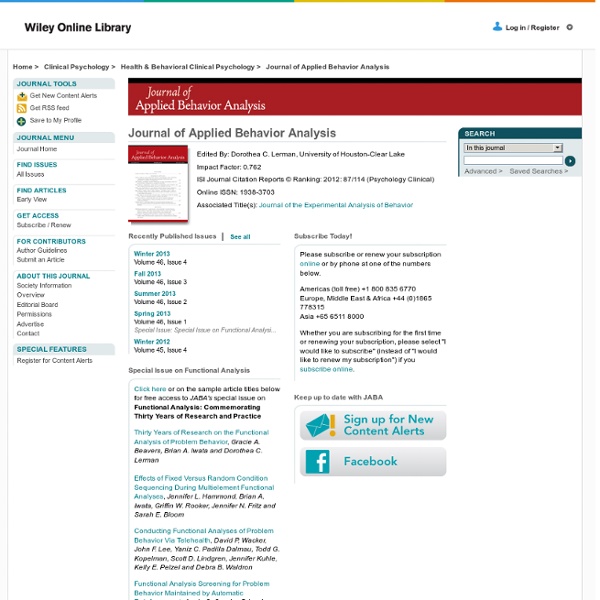welcome to behaviorguy.com!
What is Applied Behavior Analysis? Applied Behavior Analysis (ABA) is a branch of psychology that effects socially significant behavior change; that is to say that behavior analysts deal with behaviors that are of concern to the individual or his community. Applied Behavior Analysis is a science, and utilizes data collection and scientific analysis to determine treatment design and efficacy. For more information, click here What are the applications of ABA? Because ABA is based on the scientific understanding of human behavior, ABA is applicable anywhere people are doing things!
Task Analysis & Chaining - Kansas City Behavior Analysts
Sometimes entire task presentation is overwhelming. Think of preparing a 5 course meal for a crowd of 200, building a car engine or completing a physics problem. Yikes! If we break down the entire skill into tiny, more manageable parts, it makes the entire task feel less taxing on us all. Oftentimes, our kids also feel overwhelmed completing tasks that feel extreme to them, too. Examples such as hand washing, toothbrushing, face washing, loading/unloading dishwashers, making the bed, taking a bath or shower, taking out the garbage, cleaning the bathroom and navigating the school cafeteria line can all be daunting tasks to them.
Using Behavioral Science Insights to Better Serve the American People
A growing body of evidence demonstrates that behavioral science insights -- research findings from fields such as behavioral economics and psychology about how people make decisions and act on them -- can be used to design government policies to better serve the American people. Where Federal policies have been designed to reflect behavioral science insights, they have substantially improved outcomes for the individuals, families, communities, and businesses those policies serve. For example, automatic enrollment and automatic escalation in retirement savings plans have made it easier to save for the future, and have helped Americans accumulate billions of dollars in additional retirement savings. Similarly, streamlining the application process for Federal financial aid has made college more financially accessible for millions of students. NOW, THEREFORE, by the authority vested in me as President by the Constitution and the laws of the United States, I hereby direct the following:
Kids Get Control Over Bedtime With The Bedtime Pass
When I first heard about the New York Times bestseller called Go The F— to Sleep, my only wish was that I had written it, because I sure thought it a thousand times when my kids were little. And clearly, so have millions of other parents who face that time of day with equal parts dread and exhaustion: bedtime. But there is hope — and it comes in the form of a solution that is so simple, and thus far so successful, you will be smacking your forehead wondering, "Why didn't I think of that?" (Sort of like me and that book.) It's called "the bedtime pass," and it works like this: Every night, parents give their child a five-by-seven card that is the bedtime pass.
Do you really understand selection by consequences?
By Todd A. Ward, PhD, BCBA-D Founding Editor, bSci21.org B. F.
Instruction in Functional Assessment
Chapter 1: Challenging Behaviors of Individuals with Developmental Disabilities This chapter briefly describes the characteristics of individuals with developmental disabilities and the challenging behaviors frequently displayed by this population. Research on the behavioral principles that have been shown to account for the occurrence of challenging behaviors is summarized. The risk factors contributing to individuals’ challenging behaviors and the context in which they occur are explored to lay the groundwork for the need for effective assessment and treatment methods.
GSI Teaching & Resource Center
Behaviorist teaching methods have proven most successful in areas where there is a “correct” response or easily memorized material. BackgroundView of KnowledgeView of LearningView of MotivationImplications for Teaching Background Methodological behaviorism began as a reaction against the introspective psychology that dominated the late 19th and early 20th centuries. Introspective psychologists such as Wilhelm Wundt maintained that the study of consciousness was the primary object of psychology.
What Is Behaviorism? How It Works and How It Influenced Psychology
Question: What Is Behaviorism? Behaviorism can perhaps be best summed up by the following quote from the famous psychologist John B. Watson:
DBA-SIG Homepage - Dissemination of Behavior Analysis
Talking About Behavior



